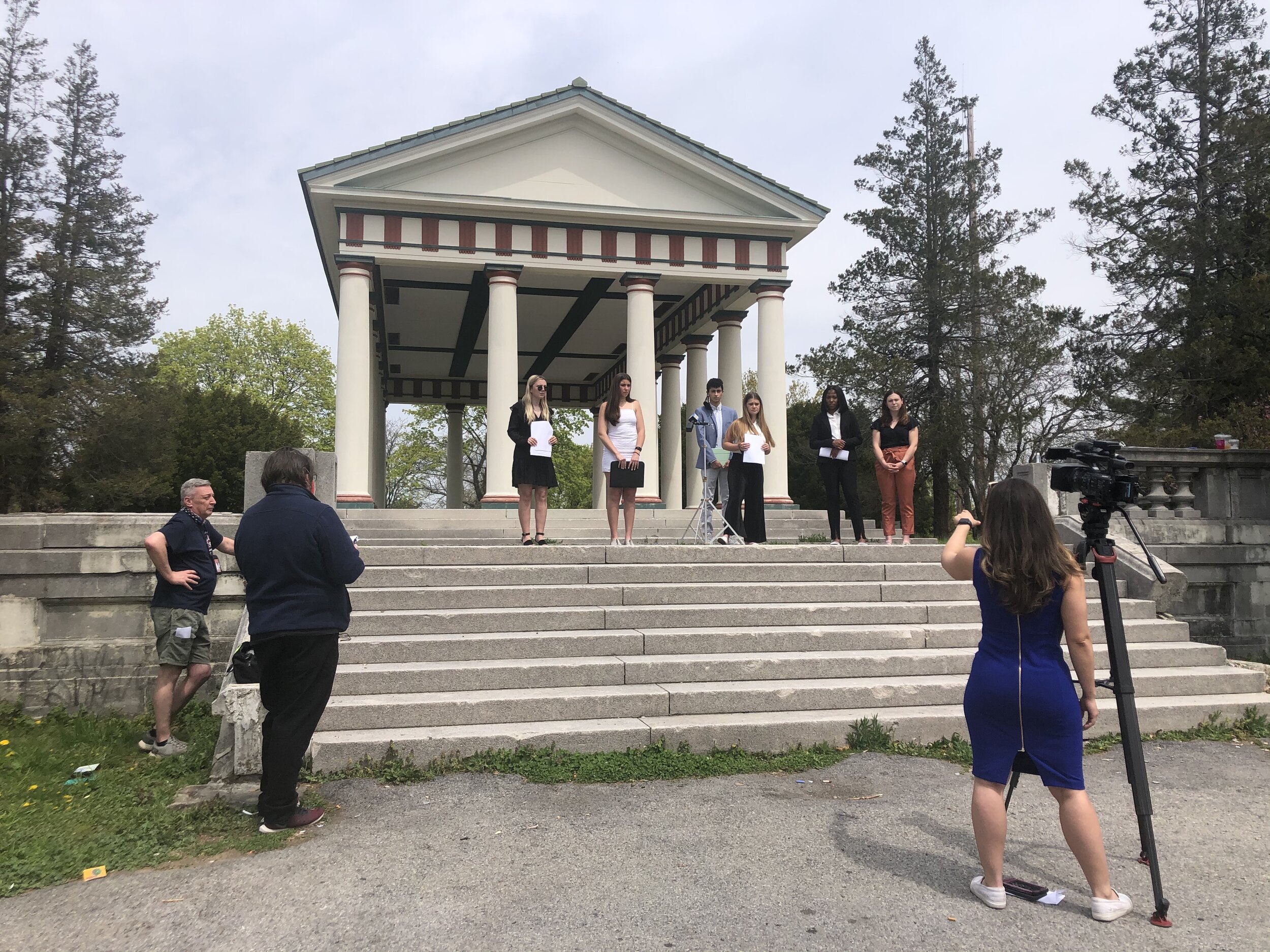Students Allege Clery Act Violations at Marist––and the College Refutes
Marist students from Marist Moderates, Purple Thread, Students Revolt and the Stand Up Speak Out protests held a press conference Wednesday at College Hill Park in Poughkeepsie. Their goal: to address sexual assault and domestic abuse on- and off-campus, condemn the administration’s response to such incidents and accuse the college of allegedly violating the Clery Act––which the college subsequently refuted.
“Essentially, Marist has ignored serious complaints about students’ behaviors, causing the dangerous sexual assault and domestic violence behavior to be further enabled and normalized, only resulting in it escalating further,” Sam Williams, one of the Stand Up Speak Out protest organizers, said at the press conference.
Reporters from Mid-Hudson News, the Poughkeepsie Journal and News 12 attended.
Clery Act Violation Accusations, Examined
The Jeanne Clery Disclosure of Campus Security Policy and Campus Crime Statistics Act, more commonly known as the Clery Act, is a federal statute that requires disclosure of campus crime statistics and other security information at colleges and universities that participate in federal student aid programs. The students accused Marist of violating the act on two fronts: first, by releasing its Annual Security Report two months late in December 2020 and, second, by violating the “timely warning” section of the Clery Act.
The college told the Marist Circle that both accusations are incorrect.
To the first accusation, Sima Ahuja, the College Counsel said: “Contrary to the allegations, the College is in full compliance with all aspects of state and federal laws, including the Clery Act. The US Department of Education dictates when these reports are released and, because of the pandemic, extended the due date for the 2017-2019 report to December 31, 2020.”
The second accusation concerns the timely warning and emergency notification obligations defined under the Clery Act, which dictates that an institution must follow appropriate procedures when “there is an immediate threat to the health or safety of students or employees occurring on campus.” According to Marist College’s procedures, outlined in the Annual Security Report, the “content of the notification, and the manner in which the college community will be notified, will depend on the nature of the emergency.”
Ahuja responded: “The allegations are completely incorrect...Every report brought to the attention of The Office of Safety and Security is assessed according to the criteria as defined in the Clery Act, and College policies and procedures.”
Williams said that she and the other students had “probable cause” that Marist had violated other sections of the Clery Act, but did not share any further evidence.
Calls for Title IX Funding
Kevin Sayegh ‘22, president and co-founder of the Marist Moderates, announced that progress had been made on establishing a student Title IX advisory board. The club started a petition calling for the advisory board following assault allegations about a Marist football player that broke out at the end of March. Sayegh said that it is set to launch before next fall, but the change must go beyond that. He said students on the advisory board will need over eight hours of training, for which he wants to see resources allocated. A half-semester first year seminar has also been discussed with administration, Sayegh said.
Marist’s Title IX Office recently lost two full-time employees and is currently being led by an interim director, Christina Daniele, who also holds a position as the vice president for human resources for the college. The students compared Marist’s Title IX office to that of Vassar College and Fairfield University and claimed that each had more full-time Title IX staff members –– Vassar’s Office of Equal Opportunity and Affirmative Action has four staff members and Fairfield’s Community Collaborative Resource Team has 10.
“Considering Marist’s competitor institutions have double to triple the amount of full-time staff in their Title IX offices, this is truly unacceptable and is a clear indication of Marist’s priorities,” Williams said. “This needs to change.”
Daniele said that the college is in the midst of a national search process for Title IX Coordinator and a Title IX Investigator.
Jahira Magnus ‘23 shared her personal experience with the college’s Title IX Office and said her alleged abuser, who she did not name, was suspended from his athletic program for no more than two weeks before the allegations were “all cleared up.” She said the abuser had pressured her into rescinding her report.
“We ask that, Marist, you do better and protect the pack like you say you will,” Magnus said.
A Continuing Effort
The press conference follows a series of on-campus protests that emerged after Amy Rendon ‘24 accused Bryan Vargas, a former college football player, of assaulting her off-campus. Williams and fellow senior Cat O’Brien joined forces to organize a protest on the Marist green on April 7 and another a week later, which turned into a march around campus. Students Revolt led another March on April 16 in the pouring rain with shouts of “Protect the pack, stop the attack.”
Now, directly addressing local media, the student organizers have taken their message to a wider audience.
“This isn’t just a Marist College problem,” Williams said. “This is a national issue and deserves more coverage than it currently gets.”
Update: A previous version of this article included a statement attributed to Alexa D’Agnostino, who later clarified that the statement originated from Sima Ahuja, the College Counsel.
Reporters from Mid-Hudson News, the Poughkeepsie Journal and News 12 attended Wednesday’s student-led press conference. Photo by Sarah Lynch
